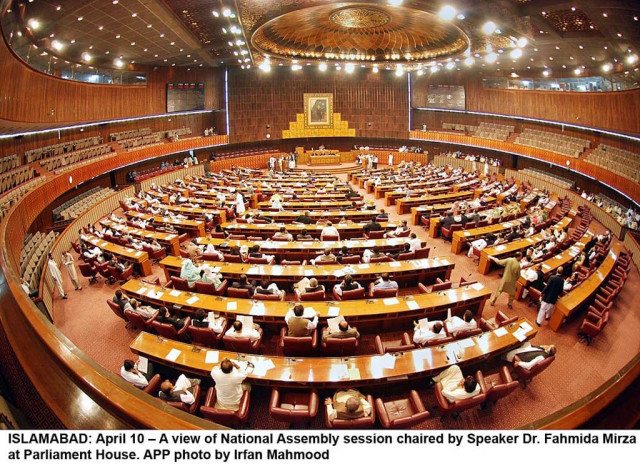Reserved seats for women: ECP working on legislation to curb nepotism
Proposed reforms will bind parties to nominate those elevated through intra-party polls.

Election authorities are working on legislation to check nepotism in the allocation of reserved seats for women and minorities in the national and provincial legislatures.
Reserved seats are allocated to a party in proportion to the number of seats it wins in the general elections. It is the sole discretion of the head of a party to nominate anyone on the reserved seats.
Under the existing law, political parties submit to election authorities a list of their candidates on reserved seats before the general elections. Reserved seats are then allocated to a party in ascending order from the same list.
Critics say reserved seats, especially for women, are doled out to the families of the top leaders of parties and their cronies.
In its proposed reforms package for the next four years, the Election Commission of Pakistan (ECP) is proposing a legislative framework to fix this issue. The commission’s legal wing is working on amendments for relevant laws in order to develop some criteria for the nomination of candidates for reserved seats.
“We will be proposing amendments in the Political Parties Order (PPO), 2002 and related laws. To encourage genuine women political workers, the ECP wants to make intra-party elections a meaningful exercise,” an ECP official told The Express Tribune.
He said the proposed reforms will encourage women to participate in active politics and bind political parties to nominate only those who have been elevated from the grass-roots level through consecutive intra-party elections.
Under the PPO 2002, intra-party polls are one of the pre-requisites for a party to be eligible for contesting elections.
But this exercise is nothing more than a formality. Political parties just submit ECP a list of office bearers after mock intra-party polls without going through the exercise.
ECP officials said unless parties evolve a proper mechanism for intra-party polls, they would remain family enterprises like they are today.
The ECP will also ask Parliament to make changes in the relevant clauses of the law dealing with intra-party polls. “These polls should be conducted and supervised by a neutral body. The ECP might take this responsibility on itself,” claimed an official who is working on proposed amendments.
Gender discrepancy in electoral rolls
Women’s general participation in active politics is not only abysmally low, but there is a huge discrepancy in the number of registered women voters against male voters. It is believed the female population is equal if not more than male population in the country. In the existing list of 86 million voters the number of women voters is 37.5 million against 48.5 million male registered voters, with a difference of 11 million.
The proposed reforms also include a segment to increase women voters in proportion to their population in the country. One of the proposals is linking CNIC with the enrolment of in electoral rolls. “Among other measures the ECP will suggest NADRA to add a new column in its database. It will ask the applicant on which address it wants to get registered as voter. Once this will be done every new CNIC-holder will automatically be enrolled as voter” an ECP official said.
There are also proposals to take punitive action against parties, groups and individuals who discourage women from polling their votes through jirgas and covert understandings. Its tall claims aside, the real test of the ECP will be when these proposals will be put forward to the parliament for legislative action.
Published in The Express Tribune, June 28th, 2014.



















COMMENTS
Comments are moderated and generally will be posted if they are on-topic and not abusive.
For more information, please see our Comments FAQ